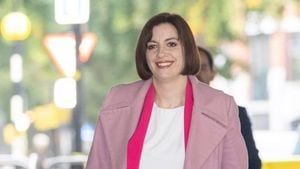Chicago is buzzing with discussions around its school leadership as local officials and educators rally behind Pedro Martinez, the current CEO of Chicago Public Schools (CPS). This support emerges during tumultuous negotiations with the Chicago Teachers Union (CTU), marking significant transitions within the city's education system.
At the forefront of this advocacy is Alderman Gilbert Villegas, representing the 36th ward. Villegas has been vocal about the need for stability, urging the CPS Board to delay any major decisions affecting Martinez's tenure. "January 15, 2025, the new hybrid school board, which Chicagoans elected, will transition in," Villegas stated confidently. "This board should be the one to initiate the process of restoring stability to our school district. They are the representatives picked by the voters."
The backdrop to this appeal is the contentious negotiations surrounding a proposed four-year contract, projected to cost up to $10 billion, which has seen its fair share of disputes. Advocates for Martinez argue passionately for his continued presence, claiming he has deftly balanced the interests of taxpayers, all the way down to negotiating with the CTU amid rising tensions. His leadership is viewed as particularly necessary during this uncertain period, especially with the looming hybrid school board set to take office.
A compelling statement came from Board member-elect Ellen Rosenfeld, who underscored the importance of patience: "The public spoke. They elected us... Give us the opportunity to settle onto the board, conduct our due diligence, and understand what Pedro Martinez is doing right and doing wrong before passing judgment on his position." This sentiment reflects growing concerns among various stakeholders who recognize the necessity of thoughtful evaluation amid changing governance structures.
The current debates also extend beyond personnel issues, concerning broader governance dynamics. Martinez's future hangs not solely on his performance but also on the shifting political sands as the new hybrid board materializes. Reports indicate underlying tensions between Martinez and Mayor Brandon Johnson, with speculation of attempts to remove him from his post. Despite the heavy assertion of support from numerous educators and elected officials, the mayor has categorically denied pushing for Martinez's resignation.
Previously, all members of the old school board had announced their resignations en masse, paving the path for the new board made up of Johnson's appointees. This fresh setup is set to meet for the first time soon, indicating rapid shifts within the governance structure of CPS and raising questions about the direction the school system is headed toward.
Only recently, news surfaced about Mayor Johnson contemplating funding mechanisms to raise teacher salaries and fulfill pension obligations through loans, which could place additional strain on the dynamics between him and Martinez, as local leaders assert the necessity for collaborative governance.
Meanwhile, significant budgetary discussions are also well underway, with the mayor aiming to finalize his financial plans and address unfulfilled promises, all under the growing pressures of union negotiations. This approach symbolizes the delicate balancing act at play, trying to maintain local support, prioritize fiscal responsibility, and manage potential unrest among educators and families alike.
Chicago now stands at a pivotal moment where every decision has the potential to reshape the educational climate. With the backdrop of union negotiations, as well as broader efforts to stabilize educational leadership, stakeholders remain active and engaged, showcasing communal investment in the future of education across the city.
This convergence of leadership concerns and educational infrastructure highlights the necessity of proactive governance and strategic decision-making. Peering through the haze of negotiations and shifting alliances, the voices advocating for stability within CPS are crafting the narrative of the city’s educational future.
Only time will tell how this saga of educational governance plays out, but one thing is sure: the stakes are high, and Chicago’s commitment to its children hangs delicately on the decisions made within these coming months.



